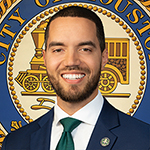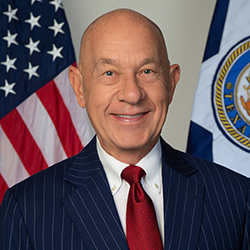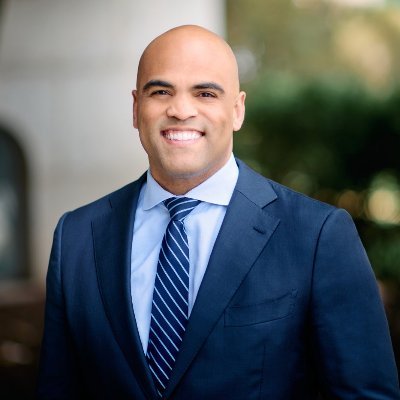Mayor John Whitmire said he has initiated an ethics investigation into Controller Chris Hollins’ decision to solicit sponsorships for a financial conference the controller’s office is hosting next week, questioning whether the practice is an example of “pay to play.”
The Houston Annual Investor Conference is now in its ninth year, but Tuesday’s event – Hollins’ first as city controller – is the first for which sponsorships have been sought, Whitmire wrote in a letter, dated Thursday, to conference participants.
The conference homepage shows Loop Capital, an investment bank, gave $50,000 to become a “platinum sponsor,” securing the firm a list of promotional opportunities at the conference. A “platinum” sponsorship also secured donors a “private dinner with the controller” in an earlier version of the sponsorship pamphlet Whitmire distributed at his Thursday press conference.
That perk is no longer listed as available for “platinum” sponsors, only for $100,000 “title” sponsors. No firms are listed as contributing at that level.
A local representative with Loop Capital directed questions to its corporate office, which could not be reached. Hollins, in a press conference Thursday afternoon, said that he viewed the proposed dinner as a nice gesture that might encourage firms to make a “meaningful” charitable contribution. Any financial institution that has asked for a meeting during his tenure, he added, has gotten one. A spokesman for his office said the change to the sponsorship packet was to fix a typo.
Three companies gave $25,000 to become “gold” sponsors, and nine people or firms contributed at the $10,000 “silver” level, including Hollins and his wife.
Whitmire said at a Thursday morning press conference he called on the topic that he started getting calls from banks that received the sponsorship packet two weeks ago.
“They said it was the appearance of pay to play, and they were seeking advice,” he said. “‘If we don’t contribute at the level of our competitors, can we still get city business? If we don’t, what are the repercussions for keeping city business?’”
Whitmire said he has asked the city’s Office of Inspector General to look into whether any city ordinances had been violated by the sponsorship solicitation. He said he won’t attend the Tuesday conference at the Hilton Americas-Houston and called on Hollins to cancel it.
“It really doesn’t need much explanation,” he said, “other than it needs to stop. It needs to be exposed.”
[…]
The packet now online specifies that sponsorship proceeds will benefit the Houston Forward Fund, which the conference website says is affiliated with the Greater Houston Community Foundation.
Among the programs associated with that fund is Bank On Houston, an effort to improve financial literacy among low-income residents that was started by the National League of Cities and with which the controller’s office has long been involved.
Expanding the program was among Hollins’ campaign pledges when he ran for the controller’s office last year. In his remarks Thursday, he reiterated that goal and stressed the controller’s office’s 16 years of work with the program.
Whitmire alleged that Hollins controls the nonprofit fund’s spending. His staff provided a screenshot showing that the fund’s mailing address on its website previously was listed as the controller’s 8th floor office at City Hall. The address now is listed as the Greater Houston Community Foundation office. A foundation spokesperson directed questions to the mayor and controller.
“I’m certain Houston Forward Fund does good charitable work,” Whitmire said, “but the controller does have the influence of where those funds are spent.”
Hollins on Thursday said the nonprofit’s board, not him, decides its spending.
Hollins also has a thread on Twitter that makes some further arguments. A few observations here:
– I’ve thought Hollins and Whitmire were on a collision course from the get-go. Most of the conflict between them before now was more conventional Mayor-versus-Controller stuff, but this is as overt as it gets.
– Mayor Whitmire says he heard about this two weeks ago, including those concerns that he says came to him, but as the story notes did not contact Hollins. I dunno, man, a call to ask “wtf, dude?” seems in order to me.
– As is often the case, the underlying question here is whether this is one of those situations where what is perfectly legal also looks sketchy because of the money involved. I don’t know the law well enough to say, but I’m sure we’ll hear plenty of opinions about it.
– Along those lines, whether something like this is illegal, in a perhaps not sufficiently well-defined way, or if it’s fully in bounds but looks bad, the Mayor is free to craft an ordinance that addresses it. I’ll be very interested to see if one is forthcoming.
– The Inspector General is appointed by the Mayor, while the IG and the Office of the IG report to the City Attorney. Like other city department heads, though, the IG may last from one administration to another. The current IG is Robin Curtis and as far as I can tell that person has been in place since at least 2016 (couldn’t find a LinkedIn profile for them), probably farther back than that. Mayor Whitmire plans to beef up the OIG and broaden its scope. I’ve not paid that much attention to the OIG – indeed, I had no idea who it was before I started writing this – so this is all for context. We’ll need to keep all this in mind when they issue a report.
– Beyond all that, whatever happens here I think is going to be filtered through the “Whitmire versus Hollins” lens, with supporters for each lining up accordingly. That’s going to make things a little awkward at City Hall for the next three years, I suspect. Campos has more.




















